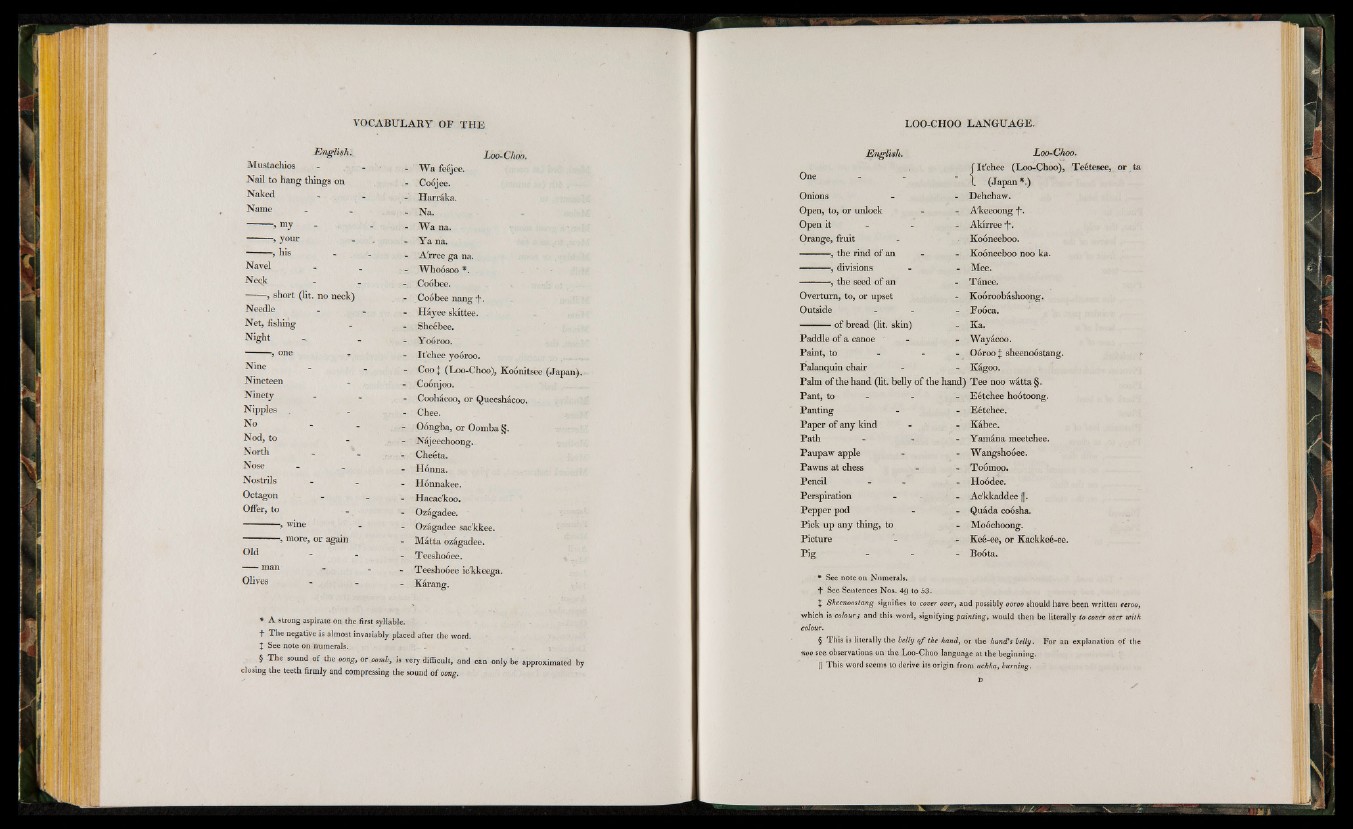
En g lish .
Mustachios
Nail to hang things on
Naked
Name
I my
5 your
, his
Navel
Neqk
— 9 short (lit. no neck)
Needle
Net, fishing
Night
9 one -
Nine
Nineteen
Ninety
Nipples
No _
Nod, to
North _
Nose
Nostrils
Octagon
Offer, to
, wine
, more, or again
Old
man
Olives
Loo-Choo.
Wa feéjee.
Coójee.
Harráka.
■ Na.
Wa na.
Ya na.
Arree ga na.
Whoósoo *.
Coóbee.
Coóbee nang *f-.
Háyee skíttee.
Sheébee.
Yoóroo.
Itchee yoóroo.
Coo| (Loo-Choo), Koónitsee (Japan).
Coónjoo.
Coohácoo, or Queeshácoo.
Chee.
Oóngba, or Oomba §.
Nájeechoong.
Cheéta.
Hónna.
Hónnakee.
Hacac'koo.
Ozágadee.
Ozágadee sac'kkee.
Mátta ozágadee.
Teeshoóee.
Teeshoóee ickkeega.
Kárang.
* A strong aspirate' on the. first syllable.
*f* The negative is almost invariably placed after the word.
J See note on numerals. - „
§ The sound of the oong, or oomb, is very difficult, and can only be approximated
closing the teeth firmly and compressing the sound of oong.
English. Loo-Choo.
f It'chee (Loo-Çhoo), Teétesee, or ta
^ ne I " 1 (Japan*.)
Onions 'k .-Dehchaw.
Open, to, or unlock A'keeoong -f*.
Open it - Akirree *f*.
Orange, fruit | Koôneeboo.
---------, the rind of an Koôneeboo noo ka.
---------, divisions Mee.
■, the seed of an Tánee.
Overturn, to, or upset Koóroobáshoong.
Outside ■ Foóca.
---------of bread (lit. skin) Ka.
Paddle of a canoe ' Wayácoo.
Paint, to OórooJ sheenoostang.
Palanquin chair - Kágoo.
Palm of the hand (ht. belly of the hand) Tee noo wátta§.
Pant, to Eétchee hoótoong.
Panting - : Eétchee.
Paper of any kind Kábee.
Path Yamána meetchee.
Paupaw apple W angshoóee.
Pawns at chess Toómoo.
Pencil - Hoódee.
Perspiration - Ac'kkaddee ||.
Pepper pod - Quáda coósha.
Pick up any thing, to Moóchoong.
Picture ■ Ä I Keé-ee, or Kackkeé-ee.
Pig Boóta.
* See note on N umerals.
f 1 See Sentences Nos. 49 to 53.
J Sheenoostang signifies to cover over, and possibly ooroo should have been written eeroo,
which is colour; and this word, signifying painting, would then be literally to cover over with
colour.
§ This is literally the belly of the hand, or the hand's belly. For an explanation of the
moo see observations on the Loo-Choo language at the beginning.
|| This word seems to derive its origin from ackka, burning.